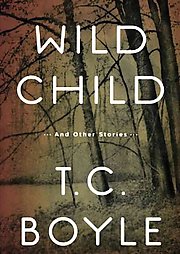One of these things is not like the others…
Ah, Book Club. It broadens my horizons to have books chosen for me. Other, normal people don’t usually pick one Bloody Knife murder mystery or free Kindle book after another – it’s healthy for me to branch out. Oftentimes I enjoy  the results – The Art of Fielding and Only Time Will Tell come to mind as recent examples – but others, well, not so much. Alas, such is the case with T.C. Boyle’s Wild Child.
the results – The Art of Fielding and Only Time Will Tell come to mind as recent examples – but others, well, not so much. Alas, such is the case with T.C. Boyle’s Wild Child.
Wild Child is a collection of short stories, 14 in total. The title story is the final in the book, and the longest, but they all have one common element: each is absolutely beautifully written. Boyle has fabulous style and his writing is not only filled with deliciously perfect sentence nuggets but also with vivid descriptions of both characters and places. Sadly, that is where most of my praise will be ending.
My major issue with the stories in Wild Child is that they lack narrators for whom we don’t have immediate and almost universal contempt. They’re wicked or stupid, arrogant (a common trait) or cruel. They may be telling the story of someone we do not loathe, but it’s difficult to enjoy a story when the person telling it is a pig. Good examples of this phenomenon are Sin Dolor, the story of a boy who can feel no pain, told by the arrogant and selfish town doctor who would really like to use the boy to further his own career, and Ash Monday, with a wicked boy as the main character and a smug, superior neighbor as the semi-narrator. No matter how beautifully written, it’s very difficult to enjoy a series of stories about and told by people who suck.
There’s also the small problem of some of the stories, especially in the first half of the book, feeling like they are simply failed attempts at longer works. They don’t feel like stories, they feel like the first chapters of books that were never finished. Balto, the first story, about a girl struggling to decide whether to tell the truth or protect her father, that begs for even a few more sentences to make it feel finished. The Lie, in which a man tells perhaps the most egregious lie imaginable, is just the setting of a stage, with no substance beyond the initial introduction of the situation. This may be the worst offender in the book – the narrator is a foul, lazy weasel and the story leads to an abrupt and unsatisfying conclusion.
The title story is definitely the strongest, a retelling of sorts of the tale of a feral child discovered living in the woods of rural France in the late 1700s. It’s a story I’ve heard about before, one that seemingly has some grain of truth but whose details have been largely lost to time and poetic license. Boyle takes the nugget of this wild boy, without language or civilization, and forms a cohesive narrative of what might have become of him given the time and place. The narrator is general and third person omniscient, with a main character that is completely sympathetic and peripherals that range from awful to wonderful in their actions and motives. Wild Child the story doesn’t suffer from either the unlikable narrator or the abrupt ending and is written in Boyle’s beautiful prose – I wish the rest of the stories were as satisfying.
Overall, the book is not worth reading for the title story alone. There are a couple others that I didn’t feel cheated after reading (La Conchita in particular, about a man reacting to the devastation of a mudslide) but in general I simply did not enjoy the stories or the characters, no matter how well they were written. I’m inclined to give Boyle another chance – perhaps with a novel in which he has more time to tell his tale and develop his characters – but I don’t recommend Wild Child. 2 stars out of 5.
— S. Millinocket
- Crossing the Pressure Line with Laura Bird - April 1, 2022
- Fall Photo Contest Winner - November 20, 2014
- Gone Girl Movie Cast Poll: You Choose the Actors! - April 12, 2013

Leave A Comment